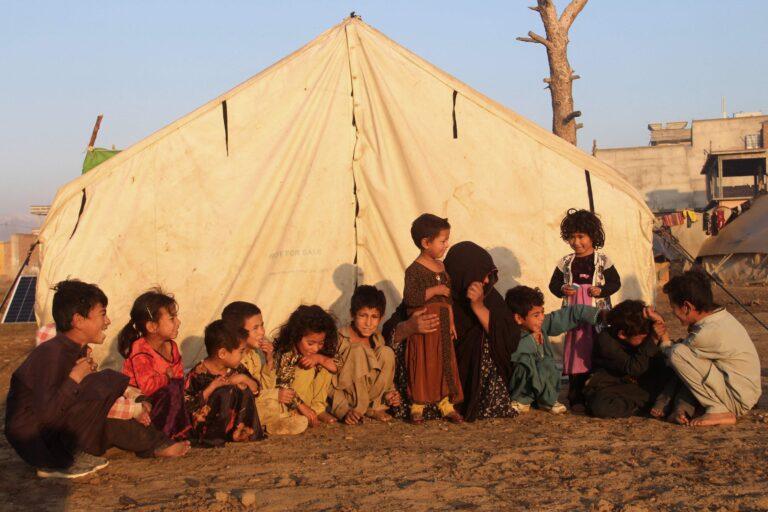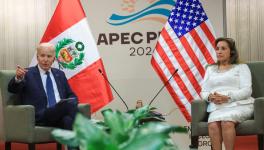US Drawdown Spurs Afghan Peace Talks

Internally displaced children sit outside a tent at a refugee camp, Khost province, Eastern Afghanistan, November 17, 2020
Prospects for the resumption of the Afghan peace talks at Doha on January 5 look bright despite the recent spike in violence involving the Taliban, Afghan government forces and the US Air Force, which have caused large scale civilian casualties. A groundswell of opinion has formed about the critical need of a reduction in violence to create a climate to charter the way forward for lasting peace.
The two seminal events leading to this point have been the Pentagon announcement on November 16 on US President Donald Trump’s decision to reduce the number of American troops in Afghanistan to 2500 by mid-January, and, secondly, the pathbreaking visit by Pakistani prime minister Imran Khan to Kabul on November 19.
If Trump has signalled that this time around, with the prospect of a second term in the White House receding, he seriously intends to force his will on troop withdrawal, Imran Khan’s first-ever trip to Kabul as prime minister can be seen as a serious attempt in the emergent scenario to try to turn the corner in the troubled Pakistan-Afghanistan relationship toward a partnership for peace in the region.
These two, inter-related tracks have gained momentum amidst the growing realisation in both Islamabad and Kabul that there isn’t going to be any radical policy shift in the Joe Biden Administration. Furthermore, the sobering effect of the virtual 2020 Afghanistan Conference in Geneva (November 23-24) must be noted.
The Afghan conference in Geneva produced pledges of $12-13 billion for the period 2021-24 representing a drop of around 20 per cent compared to the 2017-20 pledges and significantly below UNDP projections for the country’s needs. The money pledged can just about keep the Afghan state running.
Indeed, in the post-pandemic situation, it remains to be seen whether even these pledges are going to be fulfilled. Many donors have linked pledges to conditions, mainly serious steps against corruption on the part of the Afghan government led by Ashraf Ghani.
The stunning reality that the curtain is indeed coming down on the US-led war and the shocking realisation that donor fatigue has appeared within the international community add up. Some countries, among them the US as the biggest donor, have not even pledged for a full four-year period putting Afghanistan’s development on shakier ground.
In political terms, power-sharing with the Taliban is becoming a moot point. There is no alternative to it. On the other hand, from the American side too, a “conditions-based” US troop withdrawal is no longer a realistic option. The US is in no position to force “conditionality” on the Taliban, who maintain that unless the troop withdrawal is completed by May, they’d go back to war with the NATO forces.
This phenomenal paradigm shift injects a sense of urgency that a peace accord is in everyone’s interests. Of course, there are still “spoilers” around and there are seemingly irreconcilable contradictions in the regional security environment as well. Any perception that Pakistan has “won” will itself cause heartburn among some Indians.
Again, Biden’s success to make progress on the Iran nuclear issue could cement Tehran’s commitments as stakeholder in any Afghan settlement. Considering that Washington would have to seek cooperation from Moscow and Beijing to navigate any new agreements with Tehran, there is bound to be some positive fallout on the Afghan peace process as well, notwithstanding the US’ current adversarial mindset vis-a-vis Russia and China.
It is in this largely hopeful context that the recent consultations in Pakistan by the US special representative Zalmay Khalilzad, the first-ever meeting between the chairman of US Joint Chiefs of Staff General Mark Milley and the Taliban at Doha and the visit to Islamabad by the delegation of the Taliban’s Doha-based political office led by Mullah Abdul Ghani Baradar need to be assessed as paving the way for a new matrix of understanding to carry the peace talks forward.
Imran Khan has said after the meeting with Taliban representatives in Islamabad on Friday that he is concerned about “the high level of violence in Afghanistan”. He called on “all sides for a reduction in violence leading to a cease-fire” and reiterated “Pakistan’s consistent support to an inclusive, broad-based and comprehensive political settlement” in Afghanistan. Significantly, before meeting the Taliban leaders, Imran Khan had called Ghani on Wednesday.
Looking ahead, Biden would seek some residual US military presence in Afghanistan to enable “counter-terrorist” operations. Taliban, on its part, may seek a transitional government. The US would have to leverage its influence with the Afghan government to agree to a transitional government.
These could be seen as deal breakers notionally, but not necessarily. The fact of the matter is that the Afghan government’s survival depends on US financial and military support.
Meanwhile, in a development of deep political resonance, the United Nations has reached an agreement with the Taliban to establish thousands of schools in the territories held by the insurgents, where an estimated 120,000 primary school children, both boys and girls, could attend.
The symbolism is profound that the UN directly negotiated the agreement with the Taliban in this regard, implicitly recognising its legitimacy and authority. Interestingly, US and British charities and aid groups are funding the project.
Get the latest reports & analysis with people's perspective on Protests, movements & deep analytical videos, discussions of the current affairs in your Telegram app. Subscribe to NewsClick's Telegram channel & get Real-Time updates on stories, as they get published on our website.























